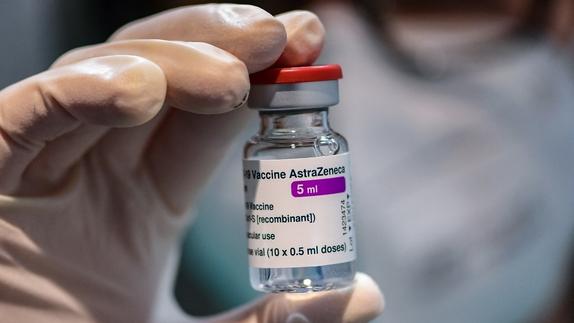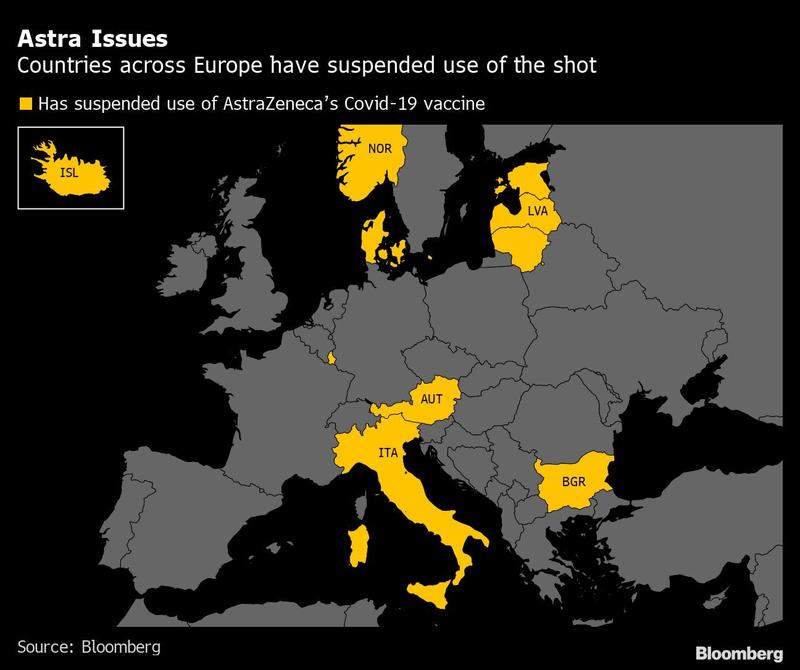 In this March 09, 2021 photo, a medical worker holds a vial of the British-Swedish AstraZeneca/Oxford vaccine during a vaccination campaign at the National Museum of Science and Technology Leonardo Da Vinci in Milan. (MIGUEL MEDINA / AFP)
In this March 09, 2021 photo, a medical worker holds a vial of the British-Swedish AstraZeneca/Oxford vaccine during a vaccination campaign at the National Museum of Science and Technology Leonardo Da Vinci in Milan. (MIGUEL MEDINA / AFP)
Europe’s problems with AstraZeneca Plc’s COVID-19 vaccine deepened, with at least 10 countries suspending use of the shot over safety concerns that Germany and France -- along with the continent’s top health authority -- say are unfounded.
Austria was first to raise concerns last weekend when it stopped using some supplies of AstraZeneca’s vaccine as a precaution following reports of a death and illness among recipients. In rapid succession, Denmark, Italy and Norway echoed the move, pointing to instances of blood clotting potentially linked to a batch of the product that health authorities want to investigate more closely. Thailand has followed suit.
Austria was first to raise concerns last weekend when it stopped using some supplies of AstraZeneca’s vaccine as a precaution following reports of a death and illness among recipients
The suspensions threaten to derail Europe’s already stuttering vaccine rollout, which trails campaigns in the UK and US and could prolong the social and economic pain of the pandemic. They follow complaints from Europe that Astra isn’t delivering enough doses, along with age restrictions that many countries put on the shot in January before recently clearing it for all adults.
Now, officials in France and Germany -- who helped spearhead the age restrictions and have recently sought to convince a sometimes skeptical public of the shot’s effectiveness -- are among the Astra vaccine’s biggest supporters.
READ MORE: AstraZeneca says it will have no vaccine supply shortfall in Q2
The German institute that oversees vaccine safety said in a statement that there have been 11 reports of instances of blood clotting -- and four deaths -- from a pool of about 1.2 million who have received the shot in the country. There’s no evidence the clotting resulted from the vaccine, leading the institute to echo the European Medicines Agency’s position that the benefits of the shot outweigh the risks.
German Health Minister Jens Spahn said Friday he takes the concerns “very seriously” while highlighting the EMA and German institute’s analysis.
“I regret that some EU countries have stopped inoculating with AstraZeneca,” Spahn said at a news conference in Berlin. “Most of them have not followed the advice of the relevant authority and the experts.”

His French counterpart, Olivier Veran, said late Thursday that only 30 people have had clotting issues out of about 5 million who’ve received the shot across Europe. There’s no evidence of causality, he added, and “no reason to suspend the AstraZeneca vaccinations.”
German Health Minister Jens Spahn said Friday he takes the concerns “very seriously” while highlighting the EMA and German institute’s analysis
Separately, the EMA’s safety committee on Friday recommended updating the vaccine’s safety information to include anaphylaxis -- a severe allergic reaction -- and hypersensitivity as side effects. The agency found that a causal link is probable in at least some instances after reviewing 41 reports of possible anaphylaxis in about 5 million UK vaccinations.
ALSO READ: S. Korea PM vouches for safety of AstraZeneca vaccine
These latest concerns about Astra’s shot come on top of persistent problems with supply to the EU. The British-Swedish company will deliver less than half the planned number of vaccines to the bloc in the second quarter, according to data based on projections for one member state seen by Bloomberg.
Astra warned of a shortfall last month after encountering issues with its vaccine yield at EU production sites, but had said it was looking to make up the loss by shipping some doses from elsewhere, including the US
Those efforts haven’t panned out because nations have grown increasingly protectionist, according to a person with knowledge of the situation, who didn’t want to be identified because the supply details are private. A spokesman for Astra declined to comment and a spokesman for the commission didn’t respond to a request.
To be sure, Denmark and other countries aren’t claiming a direct link between the Astra vaccine and unwanted side effects -- they’re calling for more research to be carried out before continuing administering the shot. Countries including Italy have only banned supplies that came from a particular production batch.
For its part, AstraZeneca said that analysis of more than 10 million records has shown no evidence of an increased risk of pulmonary embolism or deep vein thrombosis in any age group, gender, batch or country.
“In fact, the observed number of these types of events are significantly lower in those vaccinated than would be expected among the general population,” the company said.


